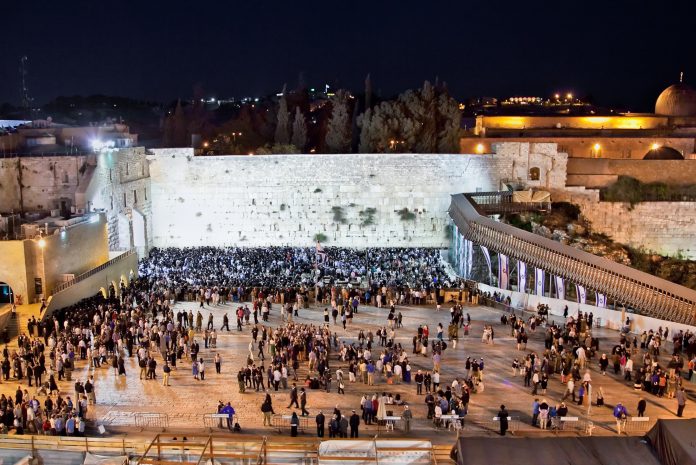By Rabbi Greg Alexander
If you are reading this, you probably care about the Kotel. So do I. It’s a place that I have visited and davened at continuously since my first time in Israel when I was 13. And it’s a place that makes me equally spiritually moved and passionately angry.
Since 1988, every Rosh Chodesh, the Women at the Wall make their way down to the kotel to pray and read Torah. Some months it all goes smoothly, some months they are abused physically and verbally, and they have even been arrested — for trying to read the Torah. Every year, nearly a thousand different tour groups from all over the world come to the egalitarian space at Robinson’s Arch to be able to run a service or celebrate a simcha with men and women counted equally. It’s a small wooden deck constructed downstairs from the Kotel plaza, accessed through a small side door away from the bustle of the kotel plaza.
It’s set in the middle of an archaeological museum and for those seeking peace and tranquillity, it’s a much better option than the kotel upstairs. That is, if you know it’s there, if you can find it, and if you have the siddurim, torah and rabbi you need with you. You see, the kotel is funded with government funds, staffed full-time by Orthodox rabbis and maintained at taxpayer expense. The Robinson’s Arch egalitarian prayer space is paid for by the liberal movements to ensure that it can function.
Ok, so why is this big news and not just a small sidebar in the bigger picture of our lives? After all if those who use the kotel (Orthodox and not) year by year don’t number more than let’s say 200 000 people out of a world Jewish population of over 15 million, what is all the fuss about?
You see, it’s not just about the kotel. It’s about Judaism as a whole in Israel and around the world. Every few years, and now again, there have been initiatives by charedi political parties to ban Orthodox conversions not officiated by their selected officials, to ban public transport and restaurants opening on Shabbat in Tel Aviv and to cut funding for non-Orthodox mikvaot in Israel. All religious activities are by default Orthodox and paid by the State. So the kotel is yet another piece in a complicated puzzle about what the Jewish state considers Jewish. This is made even more complicated by the fact that any Israeli government needs the minority Orthodox parties to survive and Netanyahu, like his predecessors, is forced to keep his cabinet partners happy.
And here’s why it matters to you and me. It’s decisions like these that call into question what Judaism is and who has the power to decide that. What is kosher, who is a rabbi, who is a Jew – all of these are hugely political decisions that have major impacts on individuals. If we leave those decisions to a small group of very powerful men, we must either assume that we do not care or that we trust that those men have our best interests at heart. I suggest that neither is a good or true assumption.
You see there are many ways to be Jewish, and I am well aware that the way that I practise my Judaism and the way I understand Torah is not the same as those who are currently fighting for the power to decide. In the best scenario, we agree to disagree and do what we understand is right in our homes and synagogues. In the worst, we spend the foreseeable future fighting in the Israeli Supreme Court and over money allocations. And the saddest and most hopeful fact is that Judaism has built within a mechanism for dealing with these disagreements, and one that has been key to its survival until today.
In the toss-up between whether conflict is to be resolved or managed, Judaism has generally opted for the management of conflict. Even in cases where a decision needed to be taken, the minority view is often cited and respected ad used for precedent in the future. The Talmud is a perfect example of this, where contradictory opinions are taught, explained, rejected and refuted and then reinstated. The winning opinion is not the only opinion.
This is a reflection of our tradition’s genius for preserving differing points of view, and thereby managing internal conflict — it is ok to disagree, as long as we do it respectfully. In the battle of p’shara (compromise) over din (judgment), it is p’shara that historically has won over in most of the great internal conflicts of Jewish history.
What the Kotel proposal, mediated by Natan Scharansky, attempts to make possible is the respect of two major trends in modern Judaism — the egalitarian and the separate — and to allow them to sit elegantly and reverently side by side in one of the most historical and sensitive religious sites in the world. May this come to be by the will of both sides and the recognition that multiple truths are not a problem but a secret for thriving.











